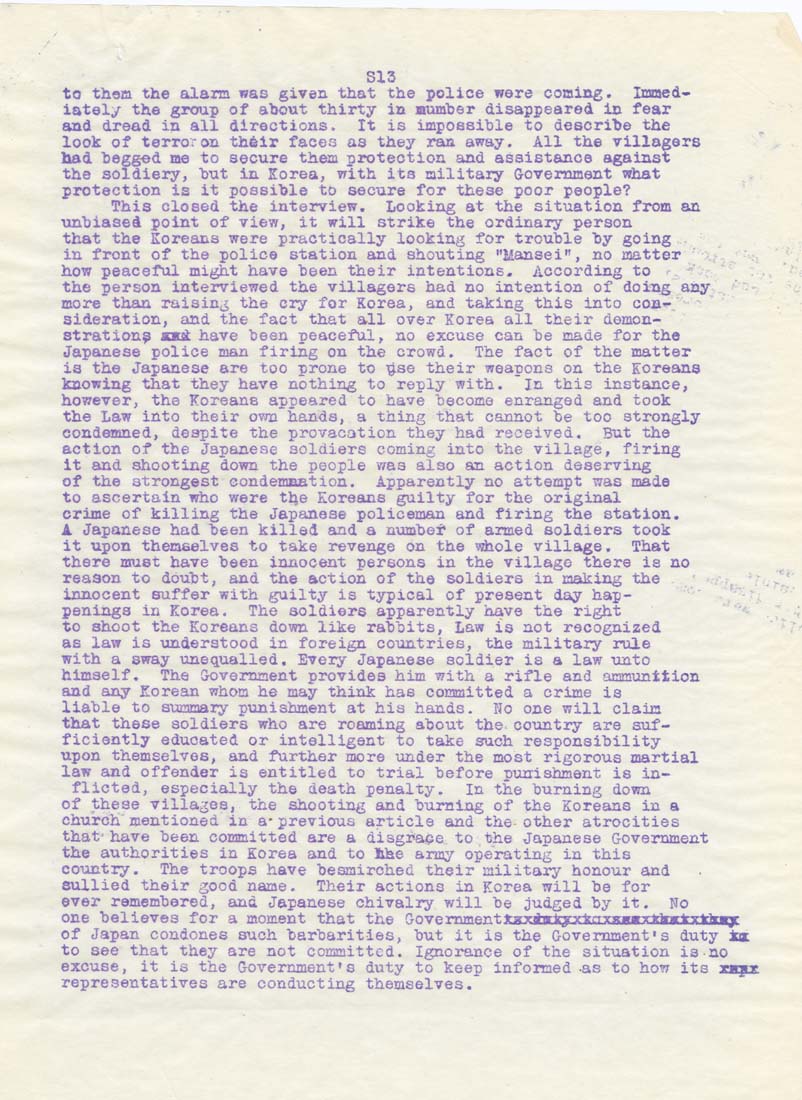S13
to them the alarm was given that the police were coming. Immed¬
iately the group of about thirty in number disappeared in fear
and dread in all directions. It is impossible to describe the
look of terroroa th6ir faces as they ran away. All the villagers
bad begged me to secure them protection and assistance against
the soldiery, but in Korea, with its military Government what
protection is it possible to secure for these poor people?
This closed the interview. Looking at the situation from an
■unbiased point of view, it will strike the ordinary person
that the Koreans were practically looking for trouble by going
in front of the police station eind shouting "Mansei", no matter
how peaceful might have been their intentions. According to r_ ';"■.:"
the person interviewed the villagers had no intention of doiag any •''-
more than raising the cry for Korea, and taking this into con¬
sideration, and the fact that all over Korea all their demon-
stration^ XKi have been peaceful, no excuse can be made for the
Japanese police man firing on the crowd. The fact of the matter
ia the Japanese are too prone to ^se their weapons on the Koreans
knowing ■that they have nothing to reply with. In this instance,
however, the Koreans appeared to have become enranged and took
the Law into their own hands, a thing that cannot be too strongly
condemned, despite the provacation they had received. But the
action of the Japanese soldiers coming into the village, firing
it and shooting down the people was also an action deserving
of the strongest eondemaation. Apparently no attempt was made
to ascertain who were the Koreems guilty for the original
crime of killing the Japanese policeman and firing the station.
A Japanese had been killed and a n-umbe* of armed soldiers took
it upon themselves to take revenge on the whole village. That
there must have been innocent persons in the village there is no
reason to doubt, and the action of the soldiers in making the
innocent suffer with guilty is typical of present day hap¬
penings in Korea. The soldiers apparently have the right
to shoot the Koreans down like rabbits. Law is not recognized
as law is understood in foreign countries, the military rule
with a sway unequalled. Every Japanese soldier is a law unto
himself. The Government provides him with a rifle and ammunition
and any Korean whom he may think has committed a crime is
liable to summary ptmishment at his hands. No one will claim
that these soldiers who are roaming about the country are suf¬
ficiently educated or intelligent to take such responsibility
upon themselves, and farther more under the most rigorous martial
law and offender is entitled to trial before punishment is in¬
flicted, especially the death penalty. In the burning down
of these villages, the shooting and burning of the Koreans in a
church" mentioned in a-previous article and the-other atrocities
that' have been committed are a disgrace to the Japanese Government
the authorities in Korea and to lihe army operating in this
country. The troops have besmirched their military honour and
sullied their good name. Their actions in Korea will be for
ever remembered, and Japanese chivalry will be judged by it. No
one believes for a moment that the r^n-o-p-mmpnt»gYi»Ti-igyirlrrr-r»»»-a-irlrg*YVlr»y
of Japan condones such barbarities, but it is the Government's duty ia.
to see that they are not committed. Ignorance of the situation is-no
excuse, it is the Government's duty to keep informed -as to how its xi^x
representatives are conducting themselves.
|








